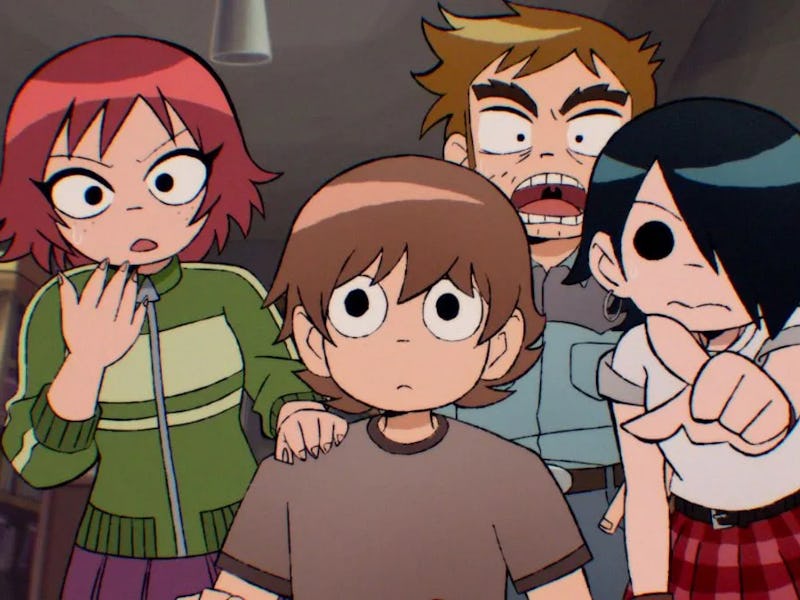Scott Pilgrim Takes Off Reveals a Disturbing Netflix Trend
What happens when creators lose complete faith in their Hollywood bosses?

Over the past 20 years, television has expanded and evolved more than almost any other art form. The popularity of shows like The Sopranos, The Wire, Mad Men, and Breaking Bad inspired other networks and creators to not only pursue more experimental ideas, but also test the limits of serialized, episodic storytelling. The Netflix-driven streaming boom has also resulted in more TV shows being made than ever before.
Unfortunately, not all of the trends established by Netflix and other streamers have been good. One need look no further than some recent comments from the creators of Scott Pilgrim Takes Off, one of this year’s most acclaimed animated shows, for proof the future of television is looking far more limited than it should.
Scott Pilgrim Takes Off is one of the year’s most surprising and ambitious TV shows.
In the days following its premiere, Scott Pilgrim Takes Off was met with universal acclaim. While discussing the series with Rolling Stone, however, creators Bryan Lee O’Malley and BenDavid Grabinski revealed it’s extremely unlikely that there will be a second season. Not only did the duo apparently cram all of their ideas into the eight-episode first season, but they also did everything they could to make sure its debut run could stand on its own.
According to O’Malley, that was partly done to ensure Scott Pilgrim Takes Off wouldn’t ever be in danger of being cut short by a premature cancellation from Netflix. “People are always complaining about how shows get canceled after one season,” the writer and cartoonist noted. “So we hedged our bets immediately, and tried to make a self-contained one season.”
O’Malley’s comments, of course, refer to the fact that Netflix has made a habit of canceling beloved and promising shows before they get the chance to truly prosper. The trend has been repeatedly called out by viewers, but Netflix’s seemingly algorithm-based method of canceling and renewing shows has caught on regardless. Nowadays, the chances of long-form, mystery-driven shows like Lost, The Leftovers, 1899, or Dark getting to stay on the air long enough to wrap up their stories seem slimmer than ever.
The number of acclaimed dramas that run longer than three or four seasons has also been slowly shrinking over the past few years. That’s concerning, especially considering some of the most acclaimed TV shows of all time (The Sopranos, Mad Men, Better Call Saul) have all proven what can happen when complex dramas are allowed to take their time and tell their stories over multiple years. O’Malley’s comments suggest TV viewers aren’t the only ones aware of the risks currently facing would-be long-form shows. TV creators are, too.
Scott Pilgrim Takes Off is shaping up to be a one-and-done adventure.
To its credit, Scott Pilgrim Takes Off manages to pull off nearly everything it sets out to do. It’s an immensely satisfying, original, and ambitious series. It doesn’t need to return, but it’s also not hard to imagine a reality where it was designed to span multiple seasons. That may not have been what Grabinski or O’Malley wanted the series to be, and that’s okay. The problem is that they felt the need to take Netflix’s cancellation habits into account in the first place.
The structure and length of TV shows shouldn’t ever depend on whether they’ll be given the chance to last more than one season, but that’s becoming increasingly common. It’s a trend that could very well result in more and more shows ignoring their potential to tell incredible long-form stories. And then the line between television and movies will continue to blur, and not for the better.
Scott Pilgrim Takes Off is streaming now on Netflix.